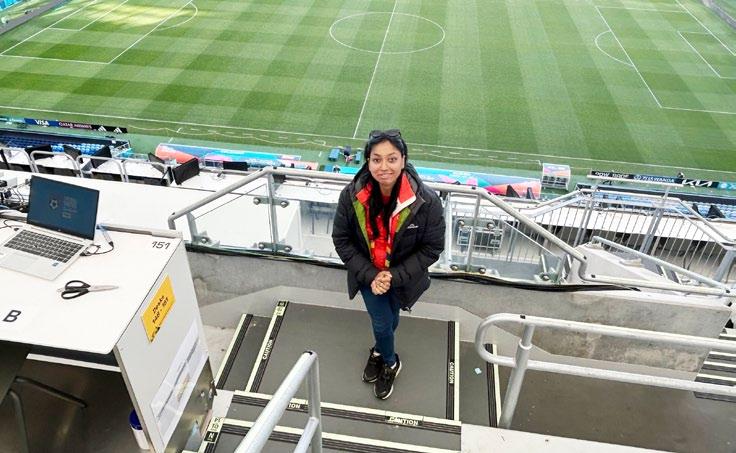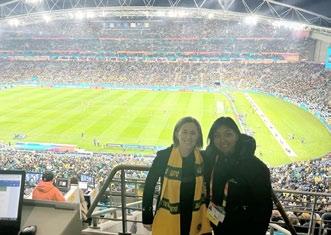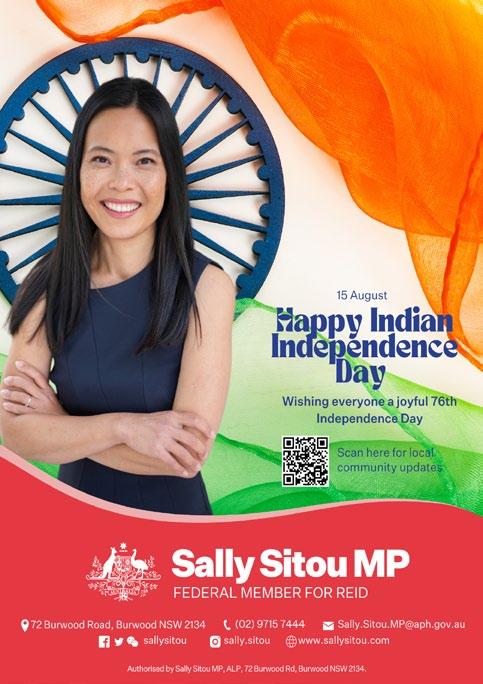
3 minute read
finding the goalposts
from 2023-08 Sydney
by Indian Link
For 30-year-old sports journalist
Annesha Ghosh, life is best lived by Irish novelist Samuel Beckett’s famous quote: Ever tried? Ever failed? No matter. Try again. Fail again. Fail better. It’s a saying that rings particularly true for Ghosh, given her journey from modest beginnings in India’s West Bengal to becoming one of the most sought-after young journalists in the world.
Ghosh speaks fondly of her roots in Behala, one of Kolkata’s oldest neighbourhoods. It’s a bustling, innately chaotic place that Ghosh still calls home. And of course, there was no escaping cricket in Behala; many of Ghosh’s formative memories involve playing cricket in her ancestral home with her two older brothers, and despite its long and storied history, Behala is perhaps most famous as the hometown of former Indian national captain Sourav Ganguly.
Equally inevitable, as a young girl in a traditional middle-class Bengali family, was a love for the arts – first, following in her mother Chhabi’s footsteps through classical dance and singing, but eventually, a voracious passion for the written word.
By her late teens, Ghosh was poring over cricket and Olympics literature. “There was some sort of enchantment that the English word has always had for me. When I used to read sports literature, it felt like a perfect marriage between the two worlds,” says Ghosh, of the allure of sports journalism over more traditional pursuits.
But becoming a successful sports journalist was by no means a fait accompli.
Many of the challenges were external. There was the sudden brush with Bell’s palsyinduced paralysis ahead of her critical ICSE exams at 16, from which Ghosh learned to “accept, look at the positives and move on”. Or Ghosh’s first beat as a journalist, in crime at the Kolkata Police Headquarters – a far cry from the international sports events which she coveted. Or the inherent challenges which come with being a woman in India.
But in many ways, Ghosh was also fighting a battle within herself, ignited by a pivotal moment: her first time watching women’s cricket live, at the 2016 ICC Women’s T20
World Cup final. On that famous night in Eden Gardens, Ghosh had an epiphany: she wanted to play the highest level of competitive cricket that she could, scratching an itch that she suddenly realised had been building since her childhood.
At 22, having never played organised cricket, Ghosh knew she was incredibly late to the party. Undeterred, Ghosh began training at the Cricket Association of Bengal, under the tutelage of renowned coaches Subhra Bhaduri and the late Dipen Rudra, each of whom Ghosh credits with both her development and women’s cricket generally.
“I put in a lot of effort, I was the fittest I’ve ever been,” says Ghosh. “It was the most formative period of my life, it taught me so many things. If you put your heart into something, you’ll get what you want. You have to make sacrifices – I was working towards something, I couldn’t see the goalposts, I was just dribbling the ball.”
No longer plagued by unfinished business, Ghosh took up the job with ESPNCricinfo and her career has since thrived. In her short career, Ghosh has written, commentated and produced content for an impressive array of global publications, including for the Guardian, BBC and ABC.
Most recently, Ghosh covered the group stages of the FIFA Women’s World Cup in Australia, the highlight being a special moment watching the Matildas’ opening game against Ireland alongside former Australian cricket vice-captain, Rachael Haynes. “It was a beautiful, emphatic statement for women’s sport: two women, largely known for cricket, at Stadium Australia witnessing that historic game live,” reminisces Ghosh.


The Indian women’s team failed to qualify for the tournament, amidst the All-India Football Federation’s ongoing administrative and governance challenges including an unprecedented suspension from FIFA last year. But Ghoshremains optimistic. “Our women players are strong enough,” she states. “Once they get better facilities, and provided the administration have their hearts in the right place, it’ll lead to better governance and better results on the world stage. But the bare minimum needs to be done first."
Despite her many sporting heroes, Ghosh doesn’t need to look far when asked of her inspiration. “I’ve seen my mother sacrifice a lot to raise me and my brother to create opportunities for us at the expense of some of her own dreams. I’m so grateful to her.”
There’s little doubt that Ghosh, too, will be inspiring generations of young journalists in the years ahead.
Fast Five
1. Favourite events you’ve covered as a journalist?
n 2018 Buenos Aires Youth Olympic Games n 2020 T20 Women’s World Cup n Sachin Tendulkar n Serena Williams n Abhinav Bindra n Australia n Ian Bishop n Natalie Germanos n Mel Jones n Colombia or Jamaica
2. Three biggest sporting heroes?
3. Favourite country in which to cover sport?
4. Dream commentary partners?
5. Who’s going to win the Women’s World Cup?
Spirit of India’s Community Development Initiatives
“Making a Difference in People’s Lives”
New Batch of Yoga Starting from 26thAugust 2023
For Update visit www.spiritofindia.org
Children are our Future &Seniors are Asset Nominal charges applied to Children Yoga, mat essential
Yoga Classes for Children (Specially Designed for Age group 5 to 12 years)
Yoga Classes Every Saturday & Sunday
Hath Yoga Batch starting from 26th Aug 2023
“Your Health is our Concern”
Not For Profit Organization Yoga Batch #59

Wentworthville
You Can ENROLL online www.spiritofindia.org

Quakers Hill

Performance contactus@spiritofindia.org
Saturday Morning 10.00 am to 12.00
26th Aug till 2rd Dec 23
Epping
For More info Contact: Suresh 0412 202 182, OR Email spiritofindia2002@yahoo.com










